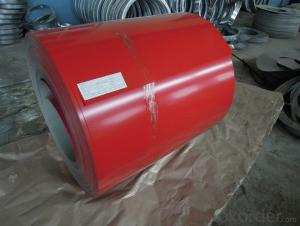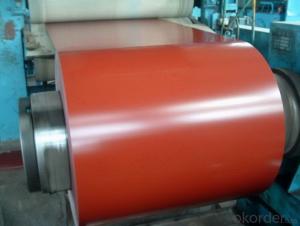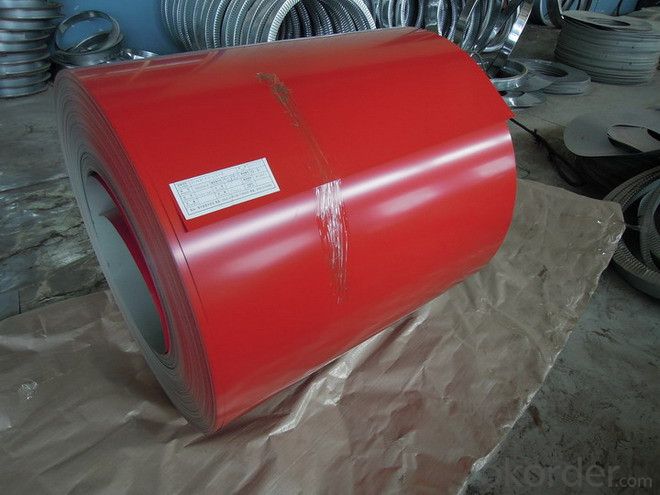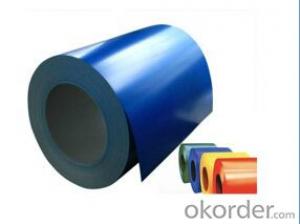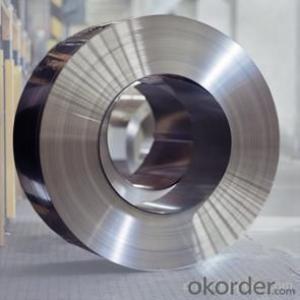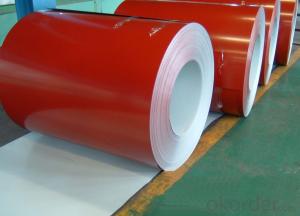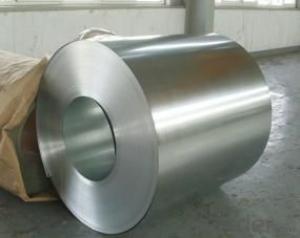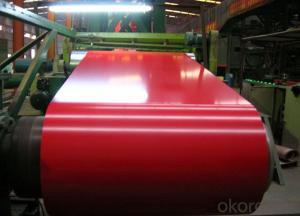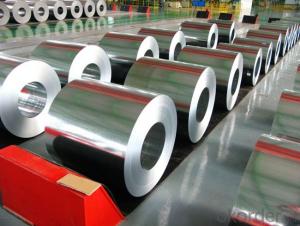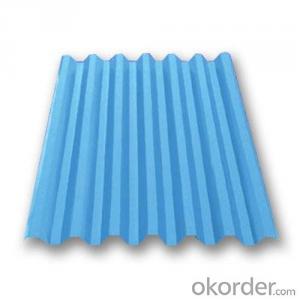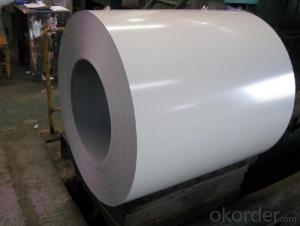color coated galvanized rolled steel coils
- Loading Port:
- Shanghai
- Payment Terms:
- TT OR LC
- Min Order Qty:
- 1 m.t.
- Supply Capability:
- 300000 m.t./month
OKorder Service Pledge
OKorder Financial Service
You Might Also Like
Specifications
Thickness : 0.14mm-1.2 mm
Width : 700mm-1250mm
Color : RAL code and as per customer
Zinc coating : 60-180g/m AZ 50-AZ275
Hardness : Normal soft/ Semi hard/ Full hard
Pre-Paint coating: 12-25um
Paint material: PE/PVDF
Color: Any color
Coil Inner Diameter: 508mm/610mm
Galvanized steel coil
Introduction:
The galvanized steel coil is made by cold rolled steel sheet, then trough chromated. unoiled, various spangles, hot dipped. The surface is coated by zinc or aluzinc. it is widely used as the raw materials of building. we have exported to midle east, africa, south america, ukraine for the good quality and best credit.
Specification:
Thickness : 0.14mm-0.8 mm
Width : 600mm-1250mm
Color : RAL code and as per customer
Zinc coating : 60-180g/m AZ 50-AZ275
Hardness : Normal soft/ Semi hard/ Full hard
Spangle: None spangle; Regular spangle; Big spangle
Surface treatment: Anti-finger/ None anti-finger
Coil Inner Diameter: 508mm/610mm
Add:
Topside: 5microns primer+ (10-20)microns polyester. Backside: 5-8microns primer epoxy.
The combining force between the galvanized or galvalume steel and the paint is very strong
The surface of Prepainted Steel Coil is normal or can be covered by film.
- Q: what is magnetic steel used for and if it can be used for producing kitchenwares utenils like stainless steel basines,mugs and bowls.
- Magnetic steel rusts. That's why kitchenware is often made out of stainless. You can't turn magnetic steel into stainless, sorry. Metalurgy is a complicated subject, and is all about different alloys. It's far too involved to explain in a few paragraphs here, but no, they're not interchangeable in this case unless you want to produce kitchenware that rusts.
- Q: How does coil slitting work?
- Coil slitting is a process used to cut large coils of material, such as metal or plastic, into narrower strips. It involves feeding the coil through a set of rotating circular blades that make longitudinal cuts along the length of the coil. The blades are set at predetermined widths to achieve the desired strip thickness. The process is usually automated and ensures efficient and precise cutting, resulting in multiple narrower coils that can be used for various industrial applications.
- Q: How long can steel coils be stored before they need to be used?
- Steel coils can typically be stored for an extended period of time, ranging from a few months to several years, depending on various factors such as the coating, storage conditions, and the type of steel. However, it is generally recommended to use or sell steel coils within a year or two to ensure their optimal quality and performance.
- Q: Can steel coils be coated with anti-microbial materials?
- Yes, steel coils can be coated with anti-microbial materials to provide protection against the growth of bacteria and other microorganisms.
- Q: How are steel coils used in the production of pipelines?
- The production of pipelines relies heavily on steel coils, which are indispensable components. These coils, crafted from top-notch steel, are utilized in the manufacturing of the pipes themselves. To initiate the process, the steel coil is unfurled and then cut into the desired size and length. The resulting pieces are then molded into cylindrical tubes through a technique known as pipe forming. Once the pipes are formed, they undergo several additional procedures to bolster their strength and durability. These may include welding, heat treatment, and coating to safeguard against corrosion. Steel coils are also employed in the creation of essential fittings and connectors required for the connection and joining of the pipes. The utilization of steel coils in pipeline production offers numerous advantages. Firstly, steel possesses exceptional strength and durability, rendering it ideal for withstanding the high pressure and stress that pipelines endure. Additionally, steel exhibits remarkable resistance to corrosion, a critical characteristic for pipelines that transport various substances like oil, gas, or water. Moreover, steel coils facilitate efficient production processes. The uniformity of the coils ensures consistent pipe dimensions, thereby facilitating easy assembly and installation. The versatility of steel allows manufacturers to customize pipes of varying sizes and specifications to meet specific project requirements. In conclusion, steel coils assume a crucial role in pipeline production. They are utilized in the creation of pipes, fittings, and connectors. The utilization of steel guarantees strength, durability, and resistance to corrosion, making it the preferred material for pipelines. Furthermore, steel coils enable efficient production processes and offer versatility in terms of customization.
- Q: How are steel coils used in the production of steel drums?
- Steel coils are used in the production of steel drums by being unwound and shaped into circular sheets. These sheets are then formed into the body of the drum, providing the necessary strength and durability.
- Q: How are steel coils used in the production of pressure vessels?
- Steel coils are used in the production of pressure vessels as they provide a strong and durable material for constructing the vessel's shell. The coils are formed into cylindrical shapes and welded together to create the vessel's body. This ensures that the vessel can withstand the high pressures it is designed to hold, making steel coils an essential component in pressure vessel manufacturing.
- Q: I have a Victorinox Pioneer, and I recently filed a little metal off the blade for some jimping. Is the already stainless steel blade still stainless?
- It's solid stainless steel, stainless steel is just an alloy. You might have rubbed off some of the finish of the blade. Just polish it up if it's bothering you.
- Q: How do steel coils compare to stainless steel coils?
- Steel coils and stainless steel coils find extensive use in various industries due to their robustness and durability. Nevertheless, selecting the appropriate material necessitates considering some essential distinctions between the two. One of the primary disparities lies in the composition of the materials. Steel coils, primarily comprising iron and carbon, incorporate additional elements to enhance specific properties. Conversely, stainless steel coils contain iron, carbon, and a substantial amount of chromium, which imparts them with distinctive corrosion-resistant attributes. Owing to the presence of chromium, stainless steel coils outperform regular steel coils in their resistance to corrosion, tarnishing, and rust. This renders stainless steel coils highly suitable for applications within environments characterized by elevated humidity, moisture, or exposure to corrosive substances. On the contrary, steel coils are more susceptible to rust and may necessitate supplementary protective coatings or treatments to avert corrosion. Another notable differentiation concerns the visual appearance of the two materials. Stainless steel coils boast a lustrous and reflective surface, endowing them with an aesthetically pleasing allure. They commonly find application in contexts where appearance holds significance, such as kitchen appliances, architectural structures, or decorative purposes. Conversely, steel coils exhibit a matte or dull finish and are frequently employed in industrial applications where visual aesthetics are of secondary concern. In terms of strength, both steel and stainless steel coils exhibit excellent mechanical properties. However, stainless steel coils generally demonstrate greater tensile strength and enhanced resistance to high temperatures. Consequently, they prove well-suited for applications necessitating strength, such as the construction, automotive, or aerospace industries. Lastly, cost represents a factor warranting consideration while comparing steel coils to stainless steel coils. Steel coils generally offer a more cost-effective option due to the lower expense of raw materials and simpler manufacturing processes. Nevertheless, when factoring in the added value of corrosion resistance and longevity, stainless steel coils may emerge as a more economical choice in the long run, requiring less maintenance and replacement. To conclude, steel coils and stainless steel coils possess distinct properties and characteristics, rendering them suitable for specific applications. Stainless steel coils exhibit superior corrosion resistance, a glossy appearance, and heightened tensile strength, while steel coils prove more cost-effective. Ultimately, the selection between the two hinges on the precise requirements of the application, encompassing factors such as the environment, aesthetics, strength, and budget.
- Q: where can you find carbon steel in los angeles?? what store?? preferabbly 01 carbon steel
- Try the internet. I'm sure the steel suppliers there know about this
Send your message to us
color coated galvanized rolled steel coils
- Loading Port:
- Shanghai
- Payment Terms:
- TT OR LC
- Min Order Qty:
- 1 m.t.
- Supply Capability:
- 300000 m.t./month
OKorder Service Pledge
OKorder Financial Service
Similar products
Hot products
Hot Searches
Related keywords
